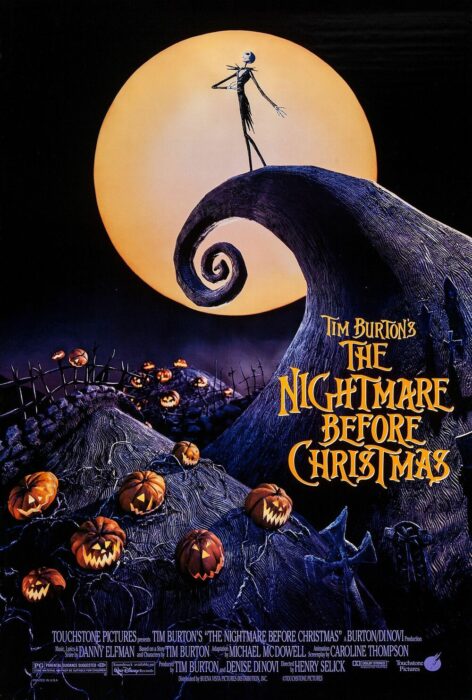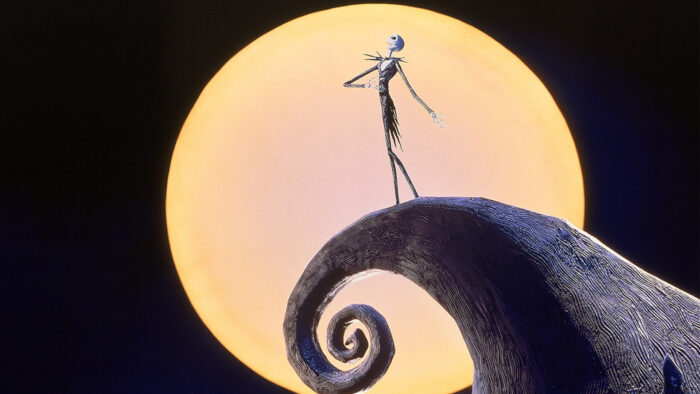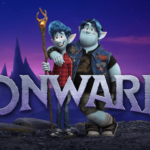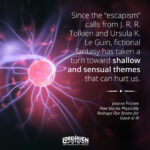Why ‘The Nightmare Before Christmas’ Can’t Deliver Holiday Joys
Fans love Tim Burton’s The Nightmare Before Christmas (1993)1 as a seminal holiday classic, set right between the calendar lines for Halloween and Christmas. I love all things autumnal and Christmas-seasonal, so logically I ought to love this film.
But I don’t.
Despite the film’s wonderful Danny Elfman soundtrack and visual artistry, I just don’t feel attached to The Nightmare Before Christmas.2 Why not? I’ve tried to unravel the reasons. I’ve asked myself strange questions, such as: does this cinematic celebration of Halloween’s darkest images carry any Christian reflections?
The Pumpkin King’s unexplained longing
In creepily stop-motion-animated Halloweentown, Jack Skellington is a self-proclaimed “master of fright” whose spooky skills depend on his being dead. He’s acclaimed by his fellow citizens: vampires, ghouls, Frankenstein-like creations, skeletons, ghosts, and other monsters. Still, Jack’s heart is empty, and he knows it. He has grown tired of all the fame and praise, which cannot meet his longing for some unknown beauty.
Jack’s dead soul yearns for something nothing in his world can satisfy.3 His longing and despair lead him into Halloweentown’s forest. There he steps through a door into another world, the vivacious Christmastown, and he wanders through new sights and sounds.
Christmastown shows him, and us, a polar opposite of Halloweentown. It’s a land overflowing with light and life, instead of sinking into darkness and death. These gifts fill his empty heart. Jack begins to feel wonder, warmth, and joy—emotions his Halloweentown revels can’t provide. Of course, Jack can’t quite comprehend all this. But he knows he wants what Christmastown’s citizens have.
Jack determines to bring the joy of Christmastown back home, so Halloweentown can experience what it has to offer. But Christmas confuses the ghouls and vampires. They cannot grasp the concept of toys that don’t frighten or harm them, and don’t understand presents or joy at all. Jack can’t make them understand.
Next, Jack seeks knowledge in books about Christmas and ponders a “logical way to explain” the holiday and its joys. Finally, he decides he’ll make Christmas his and Halloweentown’s own this year. Christmas isn’t as complicated as he thought. He can do it himself.
But Jack’s efforts ultimately fail because his dead view of the world cannot comprehend the life-filled world of Christmastown. He does not bring life to Halloweentown, and nearly ruins Christmas for both towns as well as the larger human world.
 The finale rings hollow—lacking substance, lacking life
The finale rings hollow—lacking substance, lacking life
When Jack’s Christmas fails, he falls into despair and returns to his original career: scaring people as the Pumpkin King. He returns to Halloweentown and rescues Santa and Sally from Oogie Boogie. Although Jack left Christmas a spooky shambles in the human world, Christmas is bigger than anyone’s efforts to ruin or stop it.
Here Nightmare tries its best to conjure a satisfyingly happy ending. But the story begins to flail, until it finally falls apart like Sally’s poorly sewn rag-doll limbs.
After Jack returns home, he and Sally finally voice their love for one another. Santa even gives Halloweentown a Christmas snow that seems to make everyone happy. But that single experience’s joy will quickly melt away. They can’t make more of it.
Santa is able to set everything right before Christmas Day because, as he says, “I’m Santa.” That’s it. We don’t hear about specific virtues or substantive magic, just like the Oogie Boogie whom Santa and Jack unravel to reveal nothing inside.4 This may expose the story’s central problem: lack of substance.
What if creators remade this story with a Christian worldview? The ending would turn more substantive, even while challenging. Jack would discover life that comes from a greater Source than himself, and finally understand Christmas. Life would transform this land of the dead. The ending shot of Jack and Sally on the hillside could repeat, but with more hopeful and truthful imagery. Sally’s leaf-stuffed form could become a body of flesh and blood. Jack’s dry bones could live again.
But without Christmas magic, even secular-Santa lacks substance, and these brilliantly animated puppets feel lifeless. Nightmare’s talented filmmakers can only glance at these beauties. If their camera lingered too long, even the secularized holiday’s dim light would expose the twisted absurdity of Halloweentown.
- Henry Selick directed The Nightmare Before Christmas, though Tim Burton created the story and produced the film. ↩
- I also love animated films and series, such as Cartoon Network’s Over the Garden Wall, which I reviewed in October 2020. ↩
- C. S. Lewis in Surprised by Joy called this sehnsucht. ↩
- Santa escapes Oogie’s lair with little effort—the classic laying a finger arise of his nose—raising the question of why he couldn’t escape earlier. ↩










































I’m stealing this from someone somewheres on teh interwebs, but most people seem to be let down by NBC because it is, after all, a very simple story. Jack wanted some novelty, but he forked it up. I’ve heard somewhere else that it’s a simple lesson on why appreciation is great but appropriation is not.
But at least it’s pretty?
It definitely provides a new spin on “I want more.” Sometimes the smart thing to do is want what you already have. It’s called contentment. Part of maturity as we grow up.
To jump straight for the heart, people conveniently ignore that Christmas magic is a person, Yeshua. Without Him all entertainment leaves me wanting more.